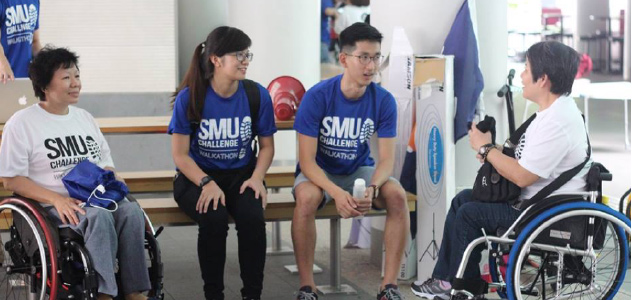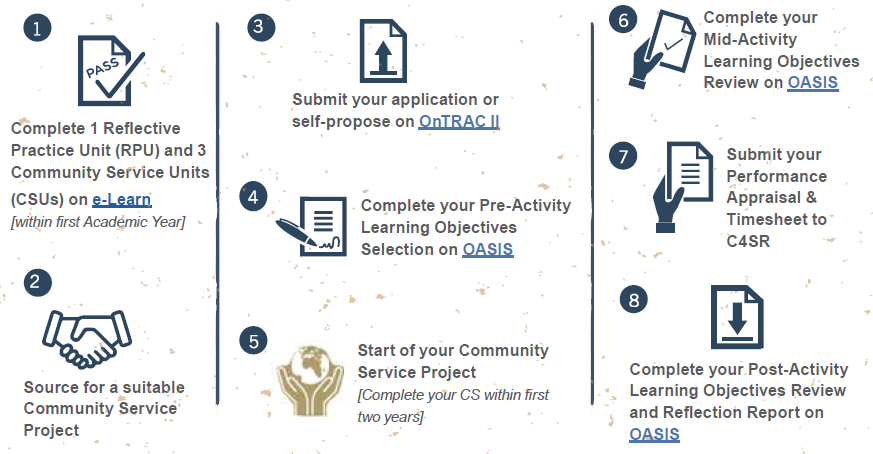
Students can start on their community service anytime during their course of study at SMU. It is best to start early, so as to ensure sufficient time to meet both the graduation requirement and the volunteer programme needs of the partner non-profit organisation.
Starting earlier also gives students more time to find a cause that they are passionate about. Many SMU students continue to volunteer beyond their graduation requirement as they see the impact of their contributions and are motivated to see through their projects with the non-profit organisations and beneficiaries.
Maximising Your Community Service Experience
We encourage students to adopt a positive attitude during the course of their service. They should use the experience to reflect on how they have been impressed and challenged, what they have learned about themselves, and how their worldview and perceptions about community needs and social service careers have changed. The Community Service experience and exposure at SMU could be the start of a lifelong commitment to community engagement and social responsibility.
Checklist:
This checklist is only applicable for AY 21, AY 20 and AY 19 students. (students in AY 18, AY 17, AY 16 and earlier cohorts should refer to their respective Community Service e-Guidebook for their CS procedures)

Performance Appraisal for Community Service
The experiential learning from community service is a key aspect of SMU’s holistic undergraduate experience that is designed to help students achieve the SMU Graduate Learning Outcomes. The supervisor from the project’s partner organisation or the project leader will assess the student’s competencies and contributions in the community service project based on SMU’s community service learning objectives which are closely aligned to the Graduate Learning Outcomes.
Assessment Rubric for SMU Community Service Learning Objectives
Project supervisor/student leader may wish to refer to this assessment rubric to guide you in assessing the student’s competencies and contributions in the community service project.
|
SMU Graduate Learning Outcomes |
SMU Community Service Learning Objectives |
Assessment Rubric |
||||
|
Excellent |
Good |
Satisfactory |
Unsatisfactory |
Not Applicable |
||
|
Critical Thinking & Problem Solving |
Analyse the root causes of social issues faced by the community |
Accurately and comprehensively identifies causes and effects of social issues faced by the beneficiary community through evaluation of qualitative and/or quantitative data. |
Accurately identifies causes and effects of social issues faced by the beneficiary community through evaluation of qualitative and/or quantitative data. |
Identifies some causes and effects of social issues faced by the beneficiary community through evaluation of qualitative and/or quantitative data. |
Unable to identify causes and effects of social issues faced by the beneficiary community. |
No opportunity to assess |
|
Demonstrate the ability to solve problems of varying levels of complexity |
Solves complex problems and potential problems using higher order thinking skills of analysing, evaluating and synthesising. |
Solves complex problems using higher order thinking skills of analysing and evaluating. |
Solves observable problems according to established procedures. |
Can only solve minor problems of minimal significance. |
No opportunity to assess |
|
|
Collaboration & Leadership |
Demonstrate the ability to recognise and leverage on strengths of others to achieve shared goals |
Consistently identifies strengths of others as well as initiates and seizes opportunities for collaboration with them. |
Frequently identifies strengths of others as well as initiates and seizes opportunities for collaboration with them. |
Occasionally identifies strengths of others as well as initiates and seizes opportunities for collaboration with them. |
Makes no attempt to identify strengths of others and/or unable to initiate and seize opportunities for collaboration with others. |
No opportunity to assess |
|
Communication |
Demonstrate the ability to communicate effectively with different stakeholders to address a problem/issue |
Communicates effectively with different stakeholders using highly appropriate oral and/or written communication so as to achieve comprehensive understanding of message and purpose. |
Communicates fairly effectively with different stakeholders using suitable oral and/or written communication so as to achieve core understanding of message and purpose. |
Communicates with different stakeholders using basic oral and/or written communication so as to achieve fundamental understanding of message and purpose. |
Fails to communicate with different stakeholders using oral and/or written communication. |
No opportunity to assess |
|
Intercultural Understanding & Sensitivity |
Display sensitivity towards individual and cultural differences and respect diverse perspectives of others |
Consistently shows deep understanding of others' cultural values, beliefs and views. Consistently includes diverse views and multiple perspectives to arrive at a common understanding. |
Frequently shows good understanding of others' cultural values, beliefs and views. Frequently includes diverse views and multiple perspectives to arrive at a common understanding. |
Occasionally shows good understanding of others' cultural values, beliefs and views. Occasionally includes diverse views and multiple perspectives to arrive at a common understanding. |
Shows only surface understanding of others' cultural values, beliefs and views. Rarely includes diverse views and multiple perspectives to arrive at a common understanding. |
No opportunity to assess |
|
Ethics & Social Responsibility |
Assess potential ethical conflicts in personal, professional and societal settings |
Identifies conflicting ethical issues correctly and evaluates multiple perspectives to propose the best course of action. |
Identifies conflicting ethical issues correctly and considers some perspectives before action. |
Identifies conflicting ethical issues correctly and organises thinking before action. |
Unable to identify conflicting ethical issues correctly and has considerable challenges recognising contentious perspectives. |
No opportunity to assess |
|
Demonstrate commitment to act responsibly to address social concerns |
Demonstrates a high level of motivation and commitment in leading initiatives/activities that drive positive social outcomes. |
Demonstrates a high level of motivation and commitment in contributing to initiatives/activities that lead to positive social outcomes. |
Demonstrates some motivation and commitment in contributing to initiatives/activities that lead to positive social outcomes. |
Demonstrates little/ no motivation and commitment in contributing to initiatives/activities that lead to positive social outcomes. |
No opportunity to assess |
|
|
Self-directedness & Meta-learning |
Demonstrate initiative to advance one’s skills and knowledge to explore and expand one’s own learning |
Continuously identifies and pursues opportunities to expand knowledge and acquire critical skills. |
Identifies and pursues opportunities to expand knowledge and acquire critical skills. |
Identifies opportunities to expand knowledge and acquire critical skills. |
Avoids identifying opportunities to expand knowledge/skills and closed to learning opportunities generally. |
No opportunity to assess |
|
Apply self-appraisal and reflective thinking in the learning process |
Reviews learning experiences in great depth, resulting in significant impact on goal achievement and future learning. |
Reviews learning experiences in some depth, resulting in notable impact on goal achievement and future learning. |
Reviews learning experiences at a surface level, resulting in some impact on goal achievement and future learning. |
Vague/no review of learning experiences. Minimal/no impact on goal achievement and future learning. |
No opportunity to assess |
|
|
Resilience & Positivity |
Demonstrate ability to persevere through challenging circumstances |
Consistently acknowledges setbacks by displaying a positive mindset and handling challenges effectively. |
Frequently acknowledges setbacks by displaying a positive mindset and handling challenges effectively. |
Occasionally acknowledges setbacks by displaying a positive mindset and handling challenges effectively. |
Has great difficulty acknowledging setbacks and handling challenges effectively. |
No opportunity to assess |